Government Grants
Business Grants
Home Owner Programs
Federal Programs
About Us
Office of Tribal Self-Governance Negotiation Cooperative Agreement
The purpose of this Negotiation Cooperative Agreement is to provide Tribes with resources to help defray costs related to preparing for and conducting Tribal Self-Governance Program (TSGP) negotiations.
TSGP negotiations are a dynamic, evolving, and Tribally-driven process that requires careful planning and preparation by both Tribal and Federal parties, including the sharing of precise, up-to-date information.
The design of the negotiations process:
1) enables a Tribe to set its own priorities when assuming responsibility for Indian Health Service (IHS) Programs, Services, Functions and Activities (PSFAs), 2) observes the government-to-government relationship between the United States and each Tribe, and 3) involves the active participation of both Tribal and IHS representatives, including the Office of Tribal Self-Governance (OTSG).
Because each Tribal situation is unique, a Tribe's successful transition into the TSGP, or expansion of their current program, requires focused discussions between the Federal and Tribal negotiation teams about the Tribe's specific health care concerns and plans.
The negotiations process has four major stages, including:
1) planning, 2) pre-negotiations, 3) negotiations, and 4) post-negotiations.
Title V of the ISDEAA requires that a Tribe or Tribal organization complete a planning phase to the satisfaction of the Tribe.
The planning phase must include legal and budgetary research and internal Tribal government planning and organizational preparation relating to the administration of health care programs.
During pre-negotiations, the Tribal and Federal negotiation teams review and discuss issues identified during the planning phase.
A draft compact, funding agreement, and funding tables are developed, typically by the Tribe, and distributed to both the Tribal and Federal negotiation teams.
These draft documents are used as the basis for pre- and final negotiations.
Pre-negotiations provide an opportunity for the Tribe and the IHS to identify and discuss issues directly related to the Tribe's compact, funding agreement, and Tribal shares.
At final negotiations, Tribal and Federal negotiation teams come together to determine and agree upon the terms and provisions of the Tribe's compact and funding agreement.
The Tribal negotiation team must include a Tribal leader from the governing body.
This representative may be a Tribal leader or a designee, like the Tribal Health Director.
The Tribal negotiation team may also include technical and program staff, legal counsel, and other consultants.
The Federal negotiations team is led by the ALN and generally includes an OTSG Program Analyst and a member of the Office of the General Counsel.
It may also include other IHS staff and subject matter experts as needed.
The Agency Lead Negotiator) ALN is the only member of the Federal negotiation team with delegated authority to negotiate on behalf of the IHS Director.
Negotiations provide an opportunity for the Tribal and Federal negotiation teams to work together in good faith to enhance each self-governance agreement.
Negotiations are not an allocation process; they provide an opportunity to mutually review and discuss budget and program issues.
As issues arise, both negotiation teams work through the issues to reach agreement on the final documents.
After the negotiations are complete, the compact and funding agreement are signed by the authorizing Tribal official and submitted to the ALN who then reviews the final package to ensure each document accurately reflects what was negotiated.
Once the ALN completes this review, the final package is submitted to the OTSG to be prepared for the IHS Director's signature.
After the compact and funding agreement have been signed by both parties, they become legally binding and enforceable agreements.
The negotiating Tribe then becomes a "Self-Governance Tribe," and a participant in the TSGP.
A Negotiation Cooperative Agreement is not a prerequisite to enter the TSGP.
A Tribe may use other resources to develop and negotiate its compact and funding agreement.
Tribes that receive a Negotiation Cooperative Agreement are not obligated to participate in Title V and may choose to delay or decline participation or expansion in the TSGP.
TSGP negotiations are a dynamic, evolving, and Tribally-driven process that requires careful planning and preparation by both Tribal and Federal parties, including the sharing of precise, up-to-date information.
The design of the negotiations process:
1) enables a Tribe to set its own priorities when assuming responsibility for Indian Health Service (IHS) Programs, Services, Functions and Activities (PSFAs), 2) observes the government-to-government relationship between the United States and each Tribe, and 3) involves the active participation of both Tribal and IHS representatives, including the Office of Tribal Self-Governance (OTSG).
Because each Tribal situation is unique, a Tribe's successful transition into the TSGP, or expansion of their current program, requires focused discussions between the Federal and Tribal negotiation teams about the Tribe's specific health care concerns and plans.
The negotiations process has four major stages, including:
1) planning, 2) pre-negotiations, 3) negotiations, and 4) post-negotiations.
Title V of the ISDEAA requires that a Tribe or Tribal organization complete a planning phase to the satisfaction of the Tribe.
The planning phase must include legal and budgetary research and internal Tribal government planning and organizational preparation relating to the administration of health care programs.
During pre-negotiations, the Tribal and Federal negotiation teams review and discuss issues identified during the planning phase.
A draft compact, funding agreement, and funding tables are developed, typically by the Tribe, and distributed to both the Tribal and Federal negotiation teams.
These draft documents are used as the basis for pre- and final negotiations.
Pre-negotiations provide an opportunity for the Tribe and the IHS to identify and discuss issues directly related to the Tribe's compact, funding agreement, and Tribal shares.
At final negotiations, Tribal and Federal negotiation teams come together to determine and agree upon the terms and provisions of the Tribe's compact and funding agreement.
The Tribal negotiation team must include a Tribal leader from the governing body.
This representative may be a Tribal leader or a designee, like the Tribal Health Director.
The Tribal negotiation team may also include technical and program staff, legal counsel, and other consultants.
The Federal negotiations team is led by the ALN and generally includes an OTSG Program Analyst and a member of the Office of the General Counsel.
It may also include other IHS staff and subject matter experts as needed.
The Agency Lead Negotiator) ALN is the only member of the Federal negotiation team with delegated authority to negotiate on behalf of the IHS Director.
Negotiations provide an opportunity for the Tribal and Federal negotiation teams to work together in good faith to enhance each self-governance agreement.
Negotiations are not an allocation process; they provide an opportunity to mutually review and discuss budget and program issues.
As issues arise, both negotiation teams work through the issues to reach agreement on the final documents.
After the negotiations are complete, the compact and funding agreement are signed by the authorizing Tribal official and submitted to the ALN who then reviews the final package to ensure each document accurately reflects what was negotiated.
Once the ALN completes this review, the final package is submitted to the OTSG to be prepared for the IHS Director's signature.
After the compact and funding agreement have been signed by both parties, they become legally binding and enforceable agreements.
The negotiating Tribe then becomes a "Self-Governance Tribe," and a participant in the TSGP.
A Negotiation Cooperative Agreement is not a prerequisite to enter the TSGP.
A Tribe may use other resources to develop and negotiate its compact and funding agreement.
Tribes that receive a Negotiation Cooperative Agreement are not obligated to participate in Title V and may choose to delay or decline participation or expansion in the TSGP.
Related Programs
Tribal Self-Governance Program: Planning and Negotiation Cooperative Agreement
Department of Health and Human ServicesObtain Full Opportunity Text:
Full Funding Opportunity Announcement
Additional Information of Eligibility:
A.
Be an "Indian Tribe" as defined in 25 U.S.C.
Section 450b(e); a "Tribal Organization" as defined in 25 U.S.C.
Section 450b(l); or an "Inter-Tribal Consortium" as defined at 42 C.F.R.
Section 137.10.
However, Alaska Native Villages or Alaska Native Village Corporations are not eligible if they are located within the area served by an Alaska Native regional health entity.
See Consolidated Appropriations Act, 2014, Pub.
L.
No.
113-76.
By statute, the Native Village of Eyak, Eastern Aleutian Tribes, and the Council for Athabascan Tribal Governments have also been deemed Alaska Native regional health entities and therefore are eligible to apply.
Those Alaska Tribes not represented by a Self-Governance Tribal consortium Funding Agreement within their area may still be considered to participate in the TSGP.
B.
Demonstrate, for three fiscal years, financial stability and financial management capability.
The Indian Tribe must provide evidence that, for the three years prior to participation in Self-Governance, the Indian Tribe has had no uncorrected significant and material audit exceptions in the required annual audit of the Indian Tribe's Self-Determination Contracts or Self-Governance Funding Agreements with any Federal agency.
See 25 U.S.C.
Section 458aaa-2; 42 C.F.R.
Sections 137.15-23.
For Tribes or Tribal organizations that expended $750,000 or more ($500,000 for FYs ending after December 31, 2003) in Federal awards, the OTSG shall retrieve the audits directly from the Federal Audit Clearinghouse.
For Tribes or Tribal organizations that expended less than $750,000 ($500,000 for FYs ending after December 31, 2003) in Federal awards, the Tribe or Tribal organization must provide evidence of the program review correspondence from IHS or Bureau of Indian Affairs officials.
See 42 C.F.R.
Sections 137.21-23.
Full Opportunity Web Address:
Contact:
Agency Email Description:
Agency Email:
paul.gettys@ihs.gov
Date Posted:
2016-03-24
Application Due Date:
2016-06-03
Archive Date:
2016-07-03
Social Entrepreneurship
Spotlight
Hexham Social Enterprise Launches Workshop to Provide Training for the Unemployed

A Gilesgate-based shop and community facility, Hexham’s Core Music, launches a separate workshop where up to six people will be trained how to repair guitars and make ukuleles. The European Social Fund grant supported the project and has secured funds through the County Durham Communication Foundation to equip the workshop in Burn Lane.

